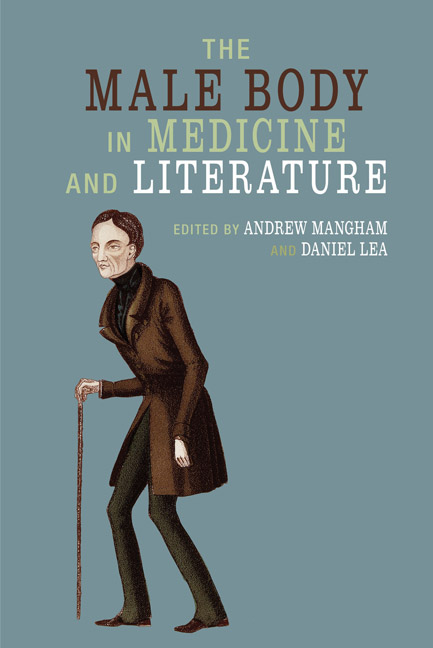Book contents
- Frontmatter
- Contents
- Acknowledgements
- Notes on Contributors
- Introduction
- Part One Enquiry and Experimentation
- Part Two Wounded and Psychopathologised Bodies
- Part Three Fear, Confusion and Contagion
- 9 ‘Sons of Belial’: Contaminated/Contaminating Victorian Male Bodies
- 10 Syphilis and Sociability: The Impolite Bodies of Two Gentlemen, James Boswell (1740–1795) and Sylas Neville (1741–1840)
- 11 ‘’Tis My Father's Fault’: Tristram Shandy and Paternal Imagination
- 12 Southern Gothic and the Queer Male Body
- Index
12 - Southern Gothic and the Queer Male Body
from Part Three - Fear, Confusion and Contagion
- Frontmatter
- Contents
- Acknowledgements
- Notes on Contributors
- Introduction
- Part One Enquiry and Experimentation
- Part Two Wounded and Psychopathologised Bodies
- Part Three Fear, Confusion and Contagion
- 9 ‘Sons of Belial’: Contaminated/Contaminating Victorian Male Bodies
- 10 Syphilis and Sociability: The Impolite Bodies of Two Gentlemen, James Boswell (1740–1795) and Sylas Neville (1741–1840)
- 11 ‘’Tis My Father's Fault’: Tristram Shandy and Paternal Imagination
- 12 Southern Gothic and the Queer Male Body
- Index
Summary
In his social-science study of gay and lesbian adolescence in the American South, education researcher James T. S ears transcribed one of his research informants, a young man identified as ‘Vince’, who had previously come out as gay to his father:
My dad is very religious. He claims to have visions. At the same time he has a girlfriend that he sleeps with three times a week. He likes [television evangelist] Jimmy Swaggart but he also takes a shine to Jim Beam [an American whiskey]. At the house, he told me that he really believed that I didn't have any choice in what I had become. ‘Your orientation’, he said, ‘is the result of some form of demonic possession’. … He took me back to when I was three years old and I let out that yell to [the 1950s rock-and-roll song] Jailhouse Rock. He asked, ‘Why were you so afraid of that song?’ … He told me that was a real significant point in my life. He thought the demon entered my soul through the grooves of that Elvis Presley record.
In the Elvis-haunted and religion-drenched South, old queens, mid-life gay men and younger postmodern queers are not surprised when the violence of life imitates that of literary art. Rejecting a medicalising explanation of homosexuality (either psychodynamic or genetic), the father imagines that a demon has taken possession of his son's body. In a culture simultaneously tolerant of queerness-as-eccentricity but hostile toward manifestations of ‘ontological’ difference from a White heterosexual norm (race, ethnicity or sexual orientation, for example), queer men's survival has depended, on the one hand, on the cunning negotiation of sanctioned social constructions – such as the camp ‘moonlight and magnolias’ view of an idealised aristocratic South or Rebel-flag neo-Confederate Southern nationalism – and, on the other, on proscribed performances (such as sodomy). This contradiction places queer men in a liminal state in which their bodies are objects of both juridical and medical inspection, interpretation and control.
Furthermore, from the middle of the twentieth century this subject position has become increasingly significant in the Southern cultural imagination since the ‘shadow of the Negro’ in the South has blended into the scenery to some degree with the end of anti-miscegenation laws, the passage of civil rights legislation, the end of de jure segregation and the growth of a Black middle class.
- Type
- Chapter
- Information
- The Male Body in Medicine and Literature , pp. 221 - 240Publisher: Liverpool University PressPrint publication year: 2018



